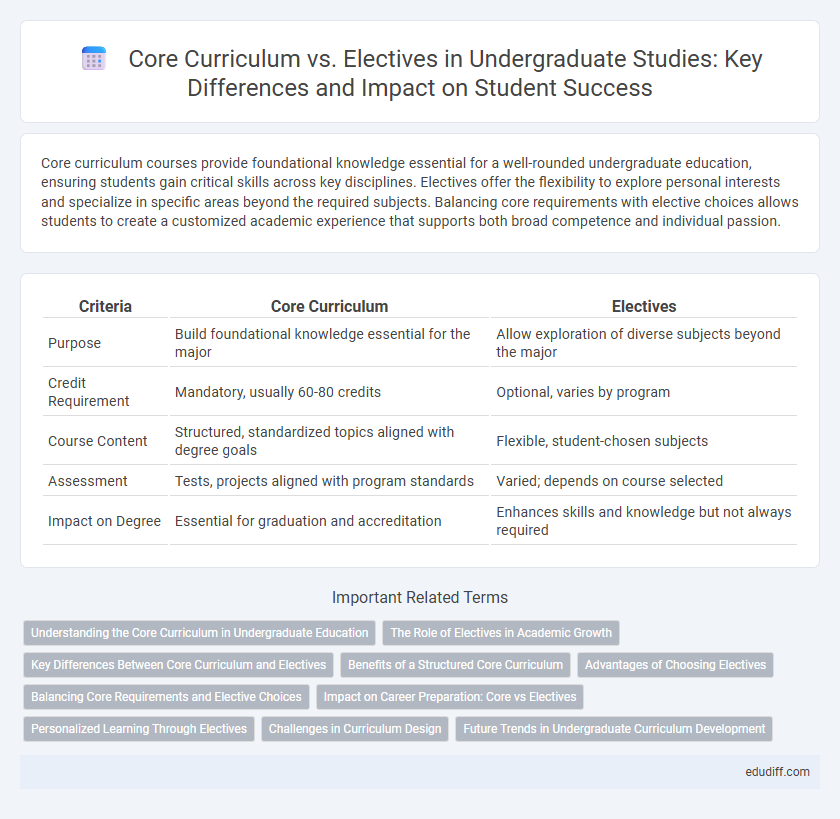Core curriculum courses provide foundational knowledge essential for a well-rounded undergraduate education, ensuring students gain critical skills across key disciplines. Electives offer the flexibility to explore personal interests and specialize in specific areas beyond the required subjects. Balancing core requirements with elective choices allows students to create a customized academic experience that supports both broad competence and individual passion.
Table of Comparison
| Criteria | Core Curriculum | Electives |
|---|---|---|
| Purpose | Build foundational knowledge essential for the major | Allow exploration of diverse subjects beyond the major |
| Credit Requirement | Mandatory, usually 60-80 credits | Optional, varies by program |
| Course Content | Structured, standardized topics aligned with degree goals | Flexible, student-chosen subjects |
| Assessment | Tests, projects aligned with program standards | Varied; depends on course selected |
| Impact on Degree | Essential for graduation and accreditation | Enhances skills and knowledge but not always required |
Understanding the Core Curriculum in Undergraduate Education
The core curriculum in undergraduate education establishes foundational knowledge and essential skills across key disciplines such as humanities, sciences, and social sciences, ensuring a well-rounded academic experience. These required courses foster critical thinking, effective communication, and quantitative reasoning, which are vital for academic success and professional development. Understanding the core curriculum enables students to build a versatile educational base before pursuing specialized knowledge through electives.
The Role of Electives in Academic Growth
Electives play a vital role in academic growth by allowing undergraduates to explore diverse fields beyond their core curriculum, fostering interdisciplinary understanding and creativity. These courses enable students to develop specialized skills and personal interests, enhancing adaptability in a dynamic job market. Integrating electives with core subjects contributes to a well-rounded education, equipping students with both depth and breadth of knowledge.
Key Differences Between Core Curriculum and Electives
Core curriculum courses provide foundational knowledge and essential skills in subjects like mathematics, science, and humanities, ensuring a well-rounded education for undergraduate students. Electives offer flexibility, allowing students to explore interests outside their major or deepen expertise in specialized fields. The primary difference lies in the requirement status: core courses are mandatory for degree completion, while electives are optional and tailored to individual academic goals.
Benefits of a Structured Core Curriculum
A structured core curriculum ensures comprehensive foundational knowledge across essential disciplines, fostering critical thinking and intellectual versatility. It promotes academic consistency and prepares students for advanced specialization by building a cohesive skill set. This approach enhances employability by equipping graduates with universally valued competencies such as communication, quantitative reasoning, and ethical understanding.
Advantages of Choosing Electives
Electives allow undergraduate students to explore diverse academic fields beyond their core curriculum, fostering interdisciplinary knowledge and personalized learning paths. Choosing electives enhances critical thinking and adaptability by exposing students to varied perspectives and skill sets, which can improve career readiness. Flexibility in electives also supports passion-driven education, increasing student engagement and motivation throughout their academic journey.
Balancing Core Requirements and Elective Choices
Balancing core curriculum requirements with elective choices allows undergraduates to build a strong foundational knowledge while exploring diverse interests that enhance critical thinking. Core courses ensure mastery of essential skills and foundational concepts in a field, whereas electives provide opportunities for specialization and interdisciplinary learning. Strategic selection of electives complements core studies, promoting academic flexibility and personal growth.
Impact on Career Preparation: Core vs Electives
Core curriculum courses build foundational knowledge and essential skills directly aligned with professional standards, ensuring students meet industry expectations and are prepared for entry-level positions. Elective courses offer opportunities to specialize in niche areas, fostering adaptability and unique expertise that can differentiate candidates in competitive job markets. Balancing core and elective coursework enhances both broad competence and targeted skills, improving overall career readiness and long-term professional growth.
Personalized Learning Through Electives
Electives offer undergraduate students the opportunity to tailor their education to personal interests and career goals, enhancing engagement and motivation beyond the foundational Core Curriculum. By selecting courses outside required core subjects, students explore diverse fields and develop specialized skills that complement their major. Personalized learning through electives fosters critical thinking, creativity, and adaptability, which are key competencies in today's dynamic job market.
Challenges in Curriculum Design
Balancing core curriculum requirements with elective options presents significant challenges in undergraduate curriculum design, as institutions must ensure foundational knowledge while allowing personalized learning paths. Core courses demand rigorous standardization to maintain academic integrity, whereas electives require flexibility to accommodate diverse student interests and emerging fields. Integrating both effectively demands continuous assessment and adaptation to evolving educational goals and labor market needs.
Future Trends in Undergraduate Curriculum Development
Future trends in undergraduate curriculum development emphasize integrating core curriculum with electives to foster interdisciplinary skills and adaptability. Increasing emphasis on technology, data literacy, and global perspectives reshapes course offerings, promoting personalized learning pathways. Educational institutions prioritize flexibility, enabling students to blend foundational knowledge with specialized electives aligned with evolving job market demands.
Core Curriculum vs Electives Infographic

 edudiff.com
edudiff.com